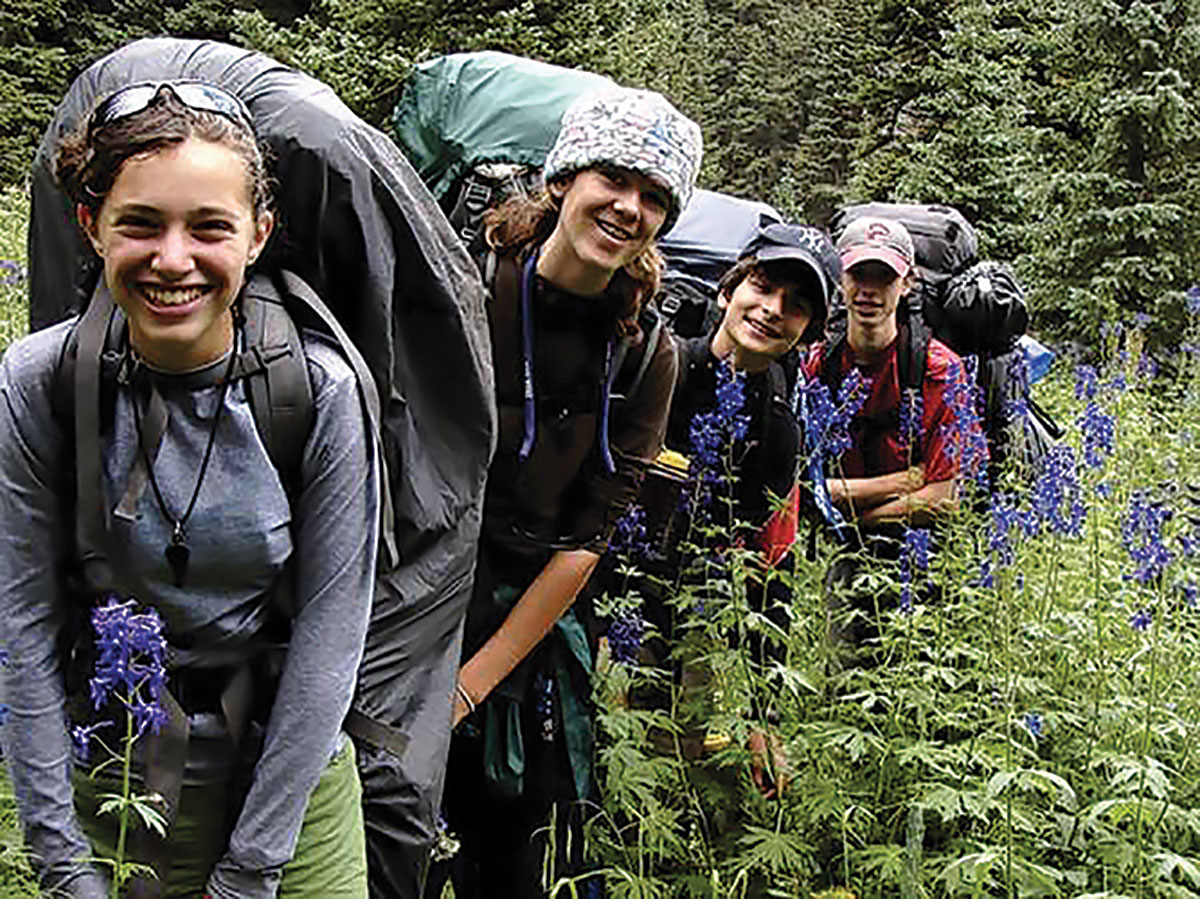
Summer camp has been an American tradition for more than 150 years, offering the perennial experience of making new friends, sleeping in bunk beds and singing songs around the campfire. But while kids are having fun, they’re also learning skills in communication, problem solving and resilience that benefit them for life. Each year, day camps and overnight camps branch out to offer more specialized programs, in areas such as gardening, rock climbing, environmental education, robotics and more. Here are intriguing new trends in summer camps and where families can take advantage of them in the Puget Sound area.
Jump ahead by topic :
STEM camps: from coding to robotics to web design, camps with a fun future focus
Nature and outdoor camps: Why kids need outdoor time more than ever
Overnight and family camps: Unplug and get away en famille
Adventure and rite of passage: Physical challenges and self-discovery

STEM camps
What and why: It’s no surprise that the greater Seattle area abounds with camps that explore STEM (science, technology, engineering and math). And for good reason. By 2020, 1.4 million computer science jobs will be available, but only 400,000 people will be trained for them (learn why everyone should learn to code). Because STEM curricula at schools can be spotty, summer is the ideal time for kids to dive in to their topic of choice, from coding to robotics to web design.
Where: The University of Washington’s STEM camps serve kids grades K–12 with options, including a new short course in “material science” for middle school and high school students, and computer programming for middle schoolers using Scratch, HTML and Java. Seattle Parks and Recreation’s robotics Lego camps were so popular last year that the organization is running four sessions in its northeast quadrant alone, hosted through Play-Well TEKnologies.
At DigiGirlz High Tech Camp in Redmond, part of Microsoft’s YouthSpark Initiative, high-school girls spend a week in workshops and exploring careers.
ID Tech runs camps for ages 6–18, offering subjects such as game design, web design, coding, programming in Java and C++, Minecraft modding and robotics, as well as Alexa Café camps for girls only (ages 10–15) with a curriculum that emphasizes creative coding, Web design, leadership and entrepreneurship. Other Seattle STEM camp stars include Girls Rock Math, DigiPen ProjectFun and Pacific Science Center camps. Find more STEM camps here .

Nature and outdoor camps
What and why: Camps that incorporate nature and outdoor experiences are not a new concept, but these days they’re spotlighting aspects such as gardening, environmental responsibility and wilderness experiences, subjects that feel increasingly important in the 21st century. According to Peg Smith, CEO of the American Camp Association, children’s time outdoors has decreased by 50 percent in the past 20 years.
“These are the kids who have the legacy of maintaining the planet and yet they’re not even exposed to the beauty of nature,” she says. “Camp addresses a really important need for kids to feel comfortable and at ease in the outdoors.” According to Smith, gardening programs have increased 28 percent in the last two years, along with a 31 percent increase in nature/environmental education.
Where: Seattle Tilth offers gardening and farm education camps for ages 6–14 in several locations around Seattle and the Eastside. Wilderness Awareness School offers perennially popular camps in several locations (Duvall, Seward Park, Saint Edward State Park) for ages 4–18 that teach kids about plants, animals, tracking and survival skills. IslandWood day camps on Bainbridge Island and in Woodinville, for grades K–8, provide kids with educational experiences in nature that also build science skills.

Overnight and family camps
What and why: Overnight camps have been popular for decades, but these days they’re even more valued for teaching old-school skills that yesteryear’s kids took for granted: independence, personal responsibility and screen-free time for play. And now, many overnight camps open up for entire families for a session or two during a summer. Mom and dad — and even grandparents — can unplug, roast marshmallows and learn to canoe alongside their kids.
Where: YMCA camps such as Camp Orkila on Orcas Island and Camp Colman in Longbranch, west of Puyallup and Camp Fire camps such as Camp Sealth on Vashon Island offer the quintessential overnight camp experience, along with “21st-century skills such as critical thinking, communication, collaboration and creativity under the guise of lots of fun and laughter,” says Meredith Cambre, overnight camps executive director at the YMCA of Greater Seattle. Overnight camps stay relevant by incorporating modern trends, including “green” efforts to source food locally, compost and recycle, or bullying prevention programs.
Within the overnight experience, family camps have added themed getaways, such as “Mom & Me” or “Grandparents & Me.” Camp Seabeck on Hood Canal welcomes grandparents and emphasizes family connection without technology. Camp Seymour in Gig Harbor welcomes extended family. The faith-based Grand Camp at Lazy F Camp in Ellensburg offers worship, wacky songs and water Olympics for grandparents and grandkids grades K–6.

Adventure and rite of passage
What and why: Adventure camps have enjoyed a 40 percent bump in popularity in the past two years, according to the American Camp Association. These camps get kids out kayaking, backpacking and climbing — experiences that deliver physical challenges in nature and foster self-discovery, leadership skills and teamwork. “The life skills getting a lot of buzz right now are courage and grit,” says the YMCA’s Cambre.
Where: The YMCA’s Boys Outdoor Leadership Development (BOLD) and Girls Outdoor Leadership Development (GOLD) for grades 6–12 have a dual mission. For boys, BOLD addresses the need for emotionally intelligent programming by providing a safe place where boys can express compassion as they develop leadership skills. GOLD aims to develop girls’ confidence and personal strength. Rite of Passage Journeys for kids ages 8–18 take kids on multiday trips in the Olympic National Park or North Cascades National Park. A unique Puget Sound opportunity, Sound Experience’s Fantastic Voyage Sailing Adventure is designed for grades 7–12. Campers spend six days exploring the San Juan Islands on the Adventuress, a two-masted schooner, and learning about marine life and our role in its protection.

Ultraflexible camps
What and why: Responding to the needs of busy parents whose work, life and vacation schedules don’t match the typical five-day workweek (or camp session), some camps offer new kinds of schedules and options.
Where: Steve and Kate’s Camp is relatively new to the Seattle area, managing three camps for grades K–7 (in Seattle, Bellevue and Tacoma) with a uniquely flexible enrollment policy and philosophy. The day camp offers highly specialized “studios” for activities such as dance, music, bread making and animation, along with many outdoor activities. The difference? There is no “schedule” — kids get a full choice of activities. Parents are “recognizing kids’ needs for developing passions over fitting into a rigid structure,” says camp partner Mike Saperstein. Conveniently, the camp allows parents to purchase day passes to use as needed according to the family’s work schedule. If you don’t use up the day passes, your money is refunded.
Summer Adventures Day Camp is another intriguing model, providing door-to-door transportation in passenger vans for its mobile day camps for kids ages 5–16. The camps run a variety of field trips to such places as the Pacific Science Center, Woodland Park Zoo, Henry Moses Water Park, Seattle Mariners games — even Great Wolf Lodge. New this year, the camp’s Challenge Zones will likely feature field games, drama, laser tag, science and more (still in the planning stage).
Why kids benefit from camp
- More than ever, kids need outdoor experiences and physical play. Camp offers myriad opportunities to try new activities, be physical and engage in free play.
- With time off from technology, kids meet other kids who are different from themselves and develop authentic relationships. According to Smith, 96 percent of kids who go to camp talk about making new friends.
- Camp promotes community. Youngsters learn teamwork, problem solving, collaboration and communication through engaging with a diverse group of children.
- Kids build resilience, confidence and independence when they are away from family, skills that are perhaps more important today than at any other point in our past.
Source: Peg Smith, CEO of the American Camp Association
More tools for finding great summer camps
Golden Teddy Award winners for camps and classes











